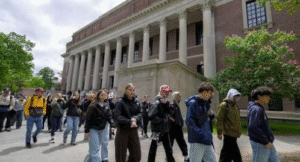
🎓 Harvard in the Eye of the Storm
Harvard, founded in 1636, has weathered wars, revolutions, and protests. But nothing quite like this academic freedom crisis. Today, it finds itself under political siege, with international students caught in the crossfire. And they’re not alone. I’ve spoken to students from across Asia, Africa, and Latin America this week. Their fear is real, not imagined.
What Triggered the Crisis?
It started with Trump’s new executive orders targeting elite universities. But the move was far from routine. These orders demand colleges prove they are “free from ideological bias.” Yet the term remains vague and dangerous. They also instruct accreditors to avoid metrics based on race, gender, or ethnicity in performance evaluations. Essentially, this strikes at the heart of diversity, equity, and inclusion (DEI) initiatives. Without DEI, campuses become less inclusive, less diverse, and more hostile to underrepresented groups.
Accreditation Now a Political Weapon
Accreditation once ensured academic rigor and quality. Now, it’s a political tool. By politicizing it, the government can now punish institutions that challenge conservative ideals or teach “unpatriotic” content. Accreditors may now avoid greenlighting schools that explore race theory, queer theory, or post-colonial studies. That erodes trust in the system. It turns educational policy into political theatre.
The Harvard Visa Suspension: A Bold, Frightening Move
Harvard’s ability to issue new I-20s, the documents required for international student visas, was suspended. The justification? Unproven allegations: antisemitism, links to the CCP, ideological manipulation. This impacts over 6,800 international students. That’s nearly one-fourth of the student body. It’s not just paperwork. It’s identity, livelihood, belonging. For students already enrolled, their status feels suddenly temporary. For future students, the dream dims.
Why This Matters to Everyone
Harvard is not just a school. It’s a symbol of American academic leadership. If it can be silenced, what happens to smaller colleges that rely on international students for survival? Schools like Howard, Bryn Mawr, and the University of Vermont don’t have Harvard’s legal arsenal. They might quietly comply. They might reduce their DEI programs. They might stop defending diverse voices altogether. This creates a chilling effect across higher education.
The International Fallout Is Already Underway
Students are already reconsidering offers. I know because my inbox is full of panicked messages from admitted applicants. A student from Kenya wrote, “Should I go to Harvard or defer? What if I get stuck mid-course?” Another from Brazil said, “My family sold property to fund my first year. Can I even apply for a visa now?” This isn’t about fearmongering. It’s reality. And it affects not just Harvard, but Yale, MIT, NYU, and beyond.
Research and Innovation Could Suffer
Trump has also threatened to:
-
Revoke Harvard’s tax-exempt status
-
Slash billions in federal research grants
-
Cap foreign students at 15% per university
That’s catastrophic. Nearly 70% of PhDs in U.S. STEM fields go to international students. Their work drives AI, biotech, and climate science. Removing them from labs doesn’t just stall progress, it helps rivals like China, Germany, and Canada race ahead.
Education as Soft Power: America Risks Losing Ground
For decades, higher education has been one of America’s greatest soft power exports. International students bring $38 billion annually to the U.S. economy and support over 400,000 jobs. But even more than dollars, they bring goodwill, diplomacy, and leadership. Five current heads of state studied in the U.S. The next generation may never consider applying. They’ll turn to Europe, Asia, and the Middle East, where education doesn’t feel so conditional.
Censorship Disguised as Neutrality
Let’s be clear, “ideological neutrality” is a code phrase. It doesn’t mean openness. It means the erasure of critical perspectives. It means no race theory. No feminism. No critique of capitalism, colonialism, or Christianity. It signals to professors and students: stay in line or stay silent. This goes beyond policy. It’s about rewriting what counts as truth in the classroom.
The Long-Term Damage We Risk
If this crackdown continues unchecked, we risk:
-
A massive drop in international enrollment
-
Weaker, less diverse academic communities
-
Slower innovation across research sectors
-
Fewer global partnerships and cultural exchanges
-
A growing brain drain away from the U.S.
And most of all, we risk losing our identity as a country that values open inquiry.
What Can We Learn from History?
This isn’t the first time political forces have tried to control education. In the 1950s, McCarthyism drove out thousands of academics. Many never recovered. American universities lost decades of thought leadership. We stand at a similar moment now. If we fail to resist, history will repeat, but this time, on a global scale.
My Work, My Responsibility
As an admissions consultant, I don’t just help students win admits. I help them believe they belong. It’s hard to do that now. How do I advise a student from Lagos or Lahore to apply in good faith when legal threats loom? Still, I won’t stop. Because education changed my life. And I’ve seen it change thousands more. That’s worth fighting for.
What You Can Do Today
Whether you’re an educator, employer, student, or policymaker, this isn’t someone else’s battle. It’s yours.
-
Educators: Speak up, even if your institution stays silent.
-
Students: Organize, document, and demand clarity from your schools.
-
Employers: Protect your international interns and hires.
-
Parents: Ask hard questions before sending your child abroad.
-
Consultants and Counselors: Prepare plans B, C, and D, just in case.
We shape this story. Not the politicians.
Final Words: The Freedom to Learn Is Not Negotiable
Education is not just about facts. It’s about freedom, to question, to rethink, to dream without borders. That freedom is under attack. And our silence won’t save it. Trump’s executive orders won’t define our future. Our collective courage will. Academic freedom is not a privilege. It’s a principle. It’s time we treat it that way.
👉 For a free profile evaluation – https://thinkbluebox.com/not-paid/faqs/faqs/free-e-consultation-form/






